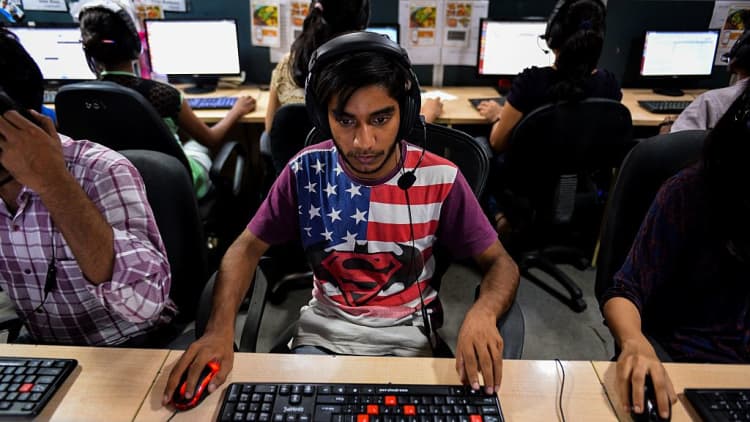
President Donald Trump's "America First" agenda and his focus on curbing immigration have stoked fears that visas widely given to technology workers may be on the chopping block.
Since the early 1990s, H-1B visas have helped companies in the U.S. access qualified — and typically lower-paid — technology workers. The visas require that recipients hold a bachelor's degree and qualify as practitioners of a "specialty occupation" in their field of study.
Currently, around 85,000 visas are granted annually to immigrants by the U.S. Citizenship and Immigration Services (USCIS), which is part of the Department of Homeland Security. After that, the individual holding the visa can apply for a green card, making H-1Bs a common path for immigrants who want to continue to work and settle in the United States.
Amid the court battles over Trump's so-called travel ban, worries have grown in India that the visa program could be next in the president's sights. The White House has said it plans to reform the H-1B program, but details about what action it will take are still unclear.

About 70 percent of the 85,000 H-1B visas granted in 2015 were issued to engineers, designers, coders and others from India, according to Goldman Sachs.
That has put the country's tech sector, including IT outsourcing companies like Infosys, Tata Consultancy Services, Wipro and Cognizant — under pressure. Wipro and Cognizant were not immediately available for comment; Tata and Infosys declined to comment for this report.
"Immigration restrictions are the main source of India's vulnerability," Sonal Varma, chief India economist at Nomura, wrote to clients. Varma went on to say that the viability of the offshoring model used by Indian software companies could be at risk.
Citi agrees.
"Immigration reform remains an overhang to watch and likely a key theme for the IT services sector in 2017," Surendra Goyal, Citi's head of India Research, wrote to clients in early January.
After India, the highest number of H-1B visas went to China, followed by Mexico, South Korea, the United Kingdom, France, Brazil and Japan.
Will Trump call for higher pay?
Aside from reducing the number of H-1B visas given by the U.S. to skilled workers, the Trump administration could increase the H-1B salary requirement so as to encourage American companies to hire workers from inside the United States rather than workers from overseas.
"Companies may opt to hire more American tech workers at higher salaries given the reduced wage gap, with increase labor costs across tech," wrote James Schneider, analyst at Goldman Sachs, to clients in a note on Feb. 3.
The current program requires H-1B visa holders to be given a minimum salary of $60,000, according to Goldman Sachs, though there may be exceptions. Goldman Sachs considers lower margins possible for IT services companies. "We calculate total costs for IT services companies could rise by 3 percent-14 percent, depending on the reforms," wrote Schneider.
Restrictions on H-1B visas have sparked curiosity about whether IT outsourcing companies that are reliant on such visas will try to place workers in China or elsewhere instead, but research and consulting firm Eurasia Group told CNBC that's unlikely.
"One of the reasons the U.S. is so attractive is the relative lack of language barriers (compared with) other countries like Japan and China. So refocusing efforts elsewhere … would be difficult," said Sasha Riser-Kositsky, Eurasia Group's Asia analyst.
The Trump administration may make the case that skilled immigrants are one of the reasons some Americans are out of work, but opponents in Silicon Valley and elsewhere will argue that many of those immigrants are behind the success of U.S. tech start-ups.


